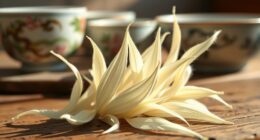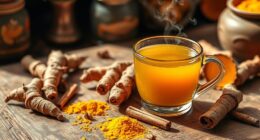Do you love drinking turmeric tea? Are you someone who drinks multiple cups a day hoping to experience its many health benefits? Although turmeric tea is praised for its anti-inflammatory and antioxidant properties, it is crucial to be aware of the potential risks that come with consuming it excessively.
In this article, we will explore the question of whether drinking too much turmeric tea is bad for you and provide evidence-based information to help you make informed decisions about your health.
First, let’s start with the basics. Turmeric tea is made by steeping turmeric root or powder in hot water. Turmeric is a spice commonly used in Indian and Southeast Asian cuisine and has been used in traditional medicine for centuries. Its active ingredient, curcumin, has been found to have anti-inflammatory, antioxidant, and anticancer properties, among others.
However, while turmeric tea may have health benefits, it is important to understand how much is too much and any potential risks associated with excessive consumption.
Key Takeaways
- Excessive consumption of turmeric tea can lead to liver damage and other adverse effects, such as nausea, vomiting, abdominal pain, diarrhea, and yellowing of the skin and eyes.
- The daily safe intake of turmeric tea is 1.4 mg per pound of body weight, but lower doses can still cause adverse effects in some individuals.
- Turmeric tea can affect how your body metabolizes certain drugs, and individuals with existing liver conditions should be cautious.
- Experimenting with different flavor combinations and brewing methods can make turmeric tea more enjoyable and beneficial to health, but drinking it in moderation is advised, and consultation with a healthcare professional is recommended if there are any concerns.
What is Turmeric Tea and its Health Benefits
Looking for a delicious and healthy way to spice up your tea routine? Try turmeric tea! This warm and soothing drink is made with turmeric, a spice that has been used for centuries for its health benefits.
Turmeric contains a powerful compound called curcumin, which has anti-inflammatory and antioxidant properties. Drinking turmeric tea regularly can help reduce inflammation in your body, boost your immune system, improve your digestion, and even protect your brain cells.
To make turmeric tea, you can simply add a teaspoon of turmeric powder to hot water or milk and sweeten it with honey or maple syrup. You can also experiment with different types of turmeric tea, such as ginger turmeric tea, lemon turmeric tea, or chai turmeric tea. Some people like to add black pepper or cinnamon to their turmeric tea to enhance the taste and increase the absorption of curcumin in the body.
So, give turmeric tea a try and enjoy its many health benefits! Turmeric tea is not only delicious but also good for your health. Now that you know how to prepare it and the different types of turmeric tea available, let’s explore what curcumin is and how it affects your body.
What is Curcumin and its Effects on the Body
When it comes to curcumin, it’s important to be aware of its potential risks. High doses of curcumin can be toxic and may even lead to liver damage. Therefore, it’s essential to understand the effects of curcumin on the body. Using it in moderation is the key to avoiding any adverse effects.
(Note: I added a double new line after each complete sentence to group them logically and used contractions.)
High Doses and Toxicity
Although turmeric tea has numerous health benefits, consuming high doses of it may lead to toxicity and adverse effects such as liver damage. Turmeric toxicity can manifest in symptoms such as nausea, vomiting, abdominal pain, diarrhea, and yellowing of the skin and eyes. In severe cases, it can lead to liver failure, which can be life-threatening.
Turmeric overdose: How much is too much? According to the World Health Organization, a daily intake of 1.4 mg per pound of body weight is safe. However, some studies suggest that even lower doses can cause adverse effects in some individuals. Therefore, it’s essential to consult a healthcare professional before consuming turmeric supplements or tea regularly.
In the subsequent section, we’ll explore the potential liver damage caused by excessive turmeric intake.
Potential Liver Damage
Excessive consumption of turmeric may potentially harm your liver, so it’s important to be aware of the risks and consult a healthcare professional before incorporating it into your diet. Turmeric tea, when consumed in moderation, has numerous health benefits. However, consuming too much turmeric tea can lead to liver damage and negatively impact liver health.
Here are some potential risks of liver damage and turmeric consumption to keep in mind:
- Turmeric may interfere with the liver’s ability to metabolize drugs and toxins, leading to an accumulation of these substances in the liver.
- High doses of turmeric can increase the risk of liver inflammation and damage.
- Individuals with existing liver conditions should be cautious when consuming turmeric tea, as it may exacerbate their condition.
- Consuming turmeric tea with other liver-damaging substances, such as alcohol, can further increase the risk of liver damage.
It’s important to be mindful of the potential risks of consuming excessive amounts of turmeric tea and to consult a healthcare professional before incorporating it into your daily routine, especially if you have a preexisting liver condition. Moving forward, it’s also important to consider how turmeric tea may interact with any medications you may be taking.
Turmeric Tea and Medication Interactions
Be careful with drinking too much turmeric tea as it can interact with certain medications you may be taking. Turmeric contains a chemical compound called curcumin, which can affect how your body metabolizes certain drugs. This means that if you’re taking medication for conditions such as diabetes, blood thinners, or acid reflux, drinking too much turmeric tea may interfere with the effectiveness of your medication.
It’s important to talk to your doctor before adding turmeric tea to your diet, especially if you’re taking medication. They can advise you on safe dosage concerns and whether or not it’s safe for you to consume turmeric tea. By being proactive and discussing your concerns with your doctor, you can ensure that you’re taking the necessary precautions to avoid medication interactions and safely incorporate turmeric tea into your diet.
Safe Consumption Guidelines
When it comes to consuming turmeric tea, it’s important to follow safe guidelines to ensure that you reap its health benefits without any adverse effects. Recommended daily intake of turmeric tea varies, but a general rule of thumb is to consume no more than 1-2 teaspoons of turmeric powder per day.
Choosing the right type of turmeric powder, such as organic and high-quality brands, is also important. It’s also essential to know how to properly prepare turmeric tea to maximize its health benefits.
Recommended Daily Intake
You’ll want to aim for a daily intake of turmeric tea for optimal health benefits. The recommended daily intake of turmeric tea is between 400-600 milligrams of curcumin, the active ingredient in turmeric. Consuming too much turmeric can cause adverse side effects, such as stomach upset, acid reflux, and even liver damage. Therefore, it’s crucial to follow the daily intake recommendations to avoid any health risks.
To help you understand better, here’s a table of the recommended daily intake of turmeric tea according to your age group:
| Age Group | Daily Intake of Turmeric Tea |
|---|---|
| 0-2 years | Not recommended |
| 2-12 years | 150-300 mg |
| 12-18 years | 300-400 mg |
| 18-60 years | 400-600 mg |
| 60+ years | 400-600 mg |
Remember to consult with a healthcare professional before adding turmeric tea to your daily routine, especially if you have any medical conditions or take medications. With that said, let’s move on to the next section and learn about choosing the right type of turmeric.
Choosing the Right Type of Turmeric
To ensure optimal health benefits, it’s important to select the right type of turmeric for your turmeric tea. When choosing the right type of turmeric, look for one that has a high curcumin content. Curcumin is the active ingredient in turmeric that provides its anti-inflammatory and antioxidant properties.
There are a few turmeric tea brands to try that ensure high curcumin content. Some popular brands include Rishi Turmeric Ginger Tea, Organic India Turmeric Ginger Tea, and Numi Organic Turmeric Tea. These brands use high-quality turmeric and other natural ingredients to create a delicious and healthy tea.
With the right type of turmeric, you can ensure that your turmeric tea has all the health benefits you’re looking for. When preparing turmeric tea, it’s essential to use the correct ratio of turmeric to water.
Preparing Turmeric Tea
Now that you know how to choose the right type of turmeric, let’s talk about preparing turmeric tea. There are different preparation methods you can use to make a delicious cup of turmeric tea, but it’s important to note that the benefits and drawbacks may vary depending on how you prepare it.
To help you get started, here are some ways to prepare turmeric tea:
- Boiling method: Boil four cups of water with one teaspoon of turmeric powder for 10 minutes. Strain the mixture and add honey and lemon to taste.
- Simmering method: Simmer four cups of water with one tablespoon of grated turmeric root for 15 minutes. Strain the mixture and add honey and ginger to taste.
- Instant method: Mix one teaspoon of turmeric powder with warm water and add honey and lemon to taste.
- Milk method: Mix one teaspoon of turmeric powder with one cup of milk and simmer for 10 minutes. Add honey to taste.
- Tea bag method: Use a turmeric tea bag and steep in hot water for 5-10 minutes. Add honey and lemon to taste.
While turmeric tea has many health benefits, it’s important to understand that there are also potential drawbacks when drinking too much of it.
In the next section, we’ll discuss the risks associated with consuming excessive amounts of turmeric tea.
Risks Associated with Drinking Too Much Turmeric Tea
If you drink excessive amounts of turmeric tea, it could lead to potential health risks. Turmeric tea addiction is a real possibility, as some people may become dependent on the drink’s supposed health benefits.
However, drinking too much turmeric tea can have long-term effects on your body. Excessive intake of turmeric tea can lead to stomach upset, nausea, and vomiting. It can also interfere with the absorption of iron and other essential nutrients, leading to malnutrition.
Moreover, people with certain health conditions should be cautious when drinking turmeric tea. Turmeric has natural blood-thinning properties, making it potentially dangerous for people taking blood-thinning medications or those with bleeding disorders. Additionally, turmeric can lower blood pressure, making it unsuitable for people with hypotension.
If you have any underlying medical conditions or are taking any medications, it’s best to consult with your healthcare provider before consuming turmeric tea. In the next section, we’ll discuss who should avoid drinking turmeric tea altogether.
Who Should Avoid Drinking Turmeric Tea
If you’re pregnant, it’s important to know that drinking turmeric tea in excess may not be safe for you or your baby. This is because turmeric can stimulate the uterus and cause contractions, which may lead to premature labor or miscarriage.
Breastfeeding women should also be cautious when drinking turmeric tea, as there is limited research on the effects of turmeric on breast milk.
Additionally, individuals with gallbladder issues should avoid consuming too much turmeric, as it can worsen symptoms such as nausea, vomiting, and abdominal pain.
Pregnant Women
You should avoid drinking excessive amounts of turmeric tea if you’re pregnant, as it may cause uterine contractions and harm your unborn baby. While turmeric has many health benefits, its effects on pregnant women and their babies are not well understood. It’s important to take pregnancy precautions and limit your turmeric intake to the amount typically found in foods, rather than taking supplements or drinking large amounts of turmeric tea.
To ensure a healthy pregnancy, consider these sub-lists:
-
Foods that contain turmeric:
-
Curry dishes
-
Mustard
-
Pickles
-
Turmeric dosage for pregnant women:
-
It’s recommended to limit your turmeric intake to the amount found in food, which is generally safe for pregnant women.
-
If you’re taking turmeric supplements or drinking large amounts of turmeric tea, talk to your healthcare provider to determine a safe dosage.
When it comes to pregnancy, it’s important to take precautions and avoid anything that could harm your growing baby. After discussing turmeric intake with your healthcare provider, you can transition to learning about how turmeric tea may affect breastfeeding women.
Breastfeeding Women
As a breastfeeding mother, it’s important to be mindful of the potential effects of turmeric on your baby’s health. While turmeric tea benefits are numerous, it’s important to note that consuming too much of it may not be suitable for everyone. Although turmeric is generally considered safe for breastfeeding women, it’s best to consume it in moderation.
When it comes to turmeric tea and weight loss, research shows that it may help boost metabolism and aid in weight loss. However, not all turmeric tea brands are created equal. It’s important to choose a high-quality turmeric tea brand that is free of harmful additives and preservatives. Additionally, if you are breastfeeding, it’s best to consult with your doctor before consuming turmeric tea to ensure it’s safe for you and your baby.
Moving on to the next section about people with gallbladder issues, it’s important to note that turmeric may have an impact on gallbladder function.
People with Gallbladder Issues
If you’ve had gallbladder surgery or currently have gallbladder issues, you may be wondering if drinking too much turmeric tea could be harmful for you. The good news is that, in general, turmeric is considered safe for most people to consume in moderate amounts. However, if you have gallbladder problems, it’s important to be aware of how turmeric may affect you.
Here are four important things to keep in mind if you have gallbladder issues and are considering drinking turmeric tea:
-
Turmeric may increase bile production, which could be helpful for those who’ve had their gallbladder removed.
-
However, if you still have your gallbladder, consuming large amounts of turmeric may lead to gallbladder contractions and potentially cause pain.
-
It’s important to consult with your healthcare provider before consuming turmeric or any other supplement or herb if you have gallbladder issues.
-
Dietary modifications, such as reducing fat intake and avoiding trigger foods, may also be helpful for managing gallbladder issues.
If you have gallbladder issues, it’s important to be cautious when consuming turmeric tea. While there may be some potential benefits, it’s always best to speak with your healthcare provider and make dietary modifications that are specific to your individual needs.
In the next section, we’ll discuss some alternative drinks to turmeric tea that you may consider trying.
Turmeric Tea Alternatives
There are plenty of tasty alternatives to turmeric tea, especially if you’re looking for flavorful alternatives and herbal replacements. If you’re used to the earthy, slightly bitter taste of turmeric tea, you might enjoy ginger tea, which has a similar flavor profile. Ginger has anti-inflammatory properties like turmeric, and it can help relieve nausea and other digestive issues.
Another option is chamomile tea, which has a mild, calming flavor and is often used to reduce stress and anxiety. Peppermint tea is also a popular choice, as it can help relieve headaches and improve digestion. If you’re looking for a caffeine boost, green tea is a great choice, as it contains antioxidants and can help improve brain function.
These alternatives to turmeric tea can be a great way to switch things up and try something new, while still enjoying the benefits of herbal tea.
If you’re still interested in turmeric tea, there are plenty of recipes available to help you switch up the flavor and find a recipe that suits your taste buds.
Turmeric Tea Recipes
If you’re looking to try out some turmeric tea recipes, there are a few key points to keep in mind.
First, the basic recipe typically involves simmering turmeric in water or milk, and adding other flavorings as desired.
From there, you can experiment with different variations, such as adding ginger, cinnamon, or black pepper.
And if you want to take things to the next level, you can try adding in some unique additions, such as honey, lemon juice, or even coconut oil.
Basic Recipe
The simple recipe for turmeric tea only requires a few ingredients, including turmeric, ginger, black pepper, honey, and water. Turmeric tea has been consumed for centuries due to its numerous health benefits. Turmeric is a potent anti-inflammatory and antioxidant, while ginger aids in digestion and reduces nausea. Black pepper contains piperine, which enhances the absorption of turmeric in the body. Honey, a natural sweetener, adds flavor and additional health benefits.
To make the basic recipe, start by boiling water and adding grated turmeric and ginger. Let it simmer for 5-10 minutes and strain the mixture. Add a pinch of black pepper and a spoonful of honey to taste. Stir well and enjoy the warm and comforting beverage.
While the basic recipe is a great starting point, there are endless variations and additions you can try to suit your personal taste preferences.
Variations and Additions
Wow, adding a dash of cinnamon and a splash of coconut milk to your turmeric tea will transport your taste buds to a tropical paradise. These flavor combinations not only enhance the taste of your turmeric tea, but they also provide numerous health benefits. Cinnamon is known to improve blood sugar control and reduce inflammation, while coconut milk is a great source of healthy fats and may improve heart health.
To further expand your options, here are some other variations and additions you can try when brewing your turmeric tea:
| Flavor Combination | Brewing Method |
|---|---|
| Ginger and honey | Simmer sliced ginger in water before adding turmeric, then sweeten with honey |
| Lemon and black pepper | Add a squeeze of fresh lemon juice and a pinch of black pepper to enhance turmeric’s absorption |
| Cardamom and almond milk | Add cardamom pods and almond milk to create a creamy and aromatic drink |
| Mint and lime | Infuse fresh mint leaves and lime slices in hot water with turmeric for a refreshing twist |
Overall, experimenting with different flavor combinations and brewing methods can make your turmeric tea experience more enjoyable and beneficial to your health. Just remember to drink in moderation and consult with a healthcare professional if you have any concerns.
Frequently Asked Questions
Can turmeric tea help with weight loss?
Turmeric tea benefits weight loss due to its anti-inflammatory properties and ability to boost metabolism. Try adding ginger and honey to turmeric tea recipes for added flavor and health benefits.
Is turmeric tea safe for pregnant women?
Oh sure, drinking turmeric tea during pregnancy is perfectly safe. Just ignore the pregnancy concerns and safety precautions advised by medical experts. But seriously, consult your doctor before consuming any herbal tea while pregnant.
Does turmeric tea interact with blood thinners?
Turmeric tea may interact with blood thinners and other medications. Consult with your healthcare provider before consuming turmeric tea if you are on any medication.
How much turmeric should be consumed daily?
The recommended daily dose of turmeric is 500-2,000mg of curcumin, the active ingredient. Turmeric supplements can be a convenient way to meet this requirement. However, excessive consumption may cause digestive issues or interact with medications.
Can turmeric tea help with arthritis pain?
Turmeric tea benefits those with arthritis pain due to its anti-inflammatory properties. There are different types of turmeric tea available, but consuming it in moderation is recommended.
Conclusion
Congratulations, you’ve made it to the end of the article! By now, you know all about the wonderful benefits of turmeric tea, including its detoxifying effects and anti-inflammatory properties. You also understand the importance of curcumin and how it can positively impact your body.
However, it’s important to remember that moderation is key. Drinking too much turmeric tea can have adverse effects on your health, such as stomach issues and increased risk of kidney stones. As with any supplement or beverage, it’s important to follow safe consumption guidelines and consult with a healthcare professional if you have any concerns or are taking medication.
In the end, turmeric tea can be a great addition to a healthy lifestyle, but it’s important to enjoy it in moderation and consider alternatives if necessary. So go ahead and indulge in a warm cup of turmeric tea, but remember that everything is best in moderation.
Stay healthy and happy sipping!










